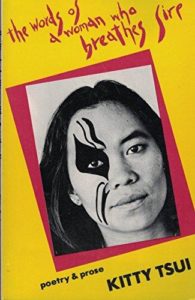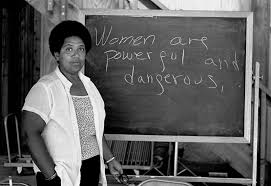Reading Queer Black Women After a Fire
by Judy Helfand
In the months after the wildfires that burned through our little farm, taking the house and all the outbuildings, I observed the changing state of my brain as illustrated through my choice of readings. At first I wasn’t reading at all and then gradually I started drifting into bookstores and finding a few appealing titles. Many of them I rejected after starting. Novels, memoirs and some history worked for me, books I could be subsumed in and that didn’t require me to engage intellectually. I read slowly. I didn’t read anything that required a response. Gradually I found myself reading more, adding in escapist books to be read fast and to turn off my brain for a break.
 During this process I was also mourning my library. Books I had read and grown from over decades had been ever present in my home, providing comfort and connection from their shelves. Some I thought I’d never be able to replace until a dying friend asked me to go through her library and take everything I wanted. Many of my old companions were there. Such relief to hold Homegirls and The Words of a Woman Who Breathes Fire and many, many books that had provided the impetus and tools to see and resist patriarchy, to find community with lesbians, and join the struggle to dismantle white supremacy. The past 40 years of my life are shaped by the hundreds of books inspiring, educating, entertaining, affirming, and challenging me.
During this process I was also mourning my library. Books I had read and grown from over decades had been ever present in my home, providing comfort and connection from their shelves. Some I thought I’d never be able to replace until a dying friend asked me to go through her library and take everything I wanted. Many of my old companions were there. Such relief to hold Homegirls and The Words of a Woman Who Breathes Fire and many, many books that had provided the impetus and tools to see and resist patriarchy, to find community with lesbians, and join the struggle to dismantle white supremacy. The past 40 years of my life are shaped by the hundreds of books inspiring, educating, entertaining, affirming, and challenging me.
A year after the fire I started buying books I knew would be challenging, that would ask me to think and respond, books by a new generation of authors I was unfamiliar with. They sat on my shelf as I continued to read novels. Finally I picked up How We Get Free: Black Feminism and the Combahee River Collective edited by Keeanga-Yamahtta Taylor. The book brought me back to the excitement of my coming out as a lesbian and a feminist, remembering when the ideas expressed in the Combahee River Collective statement were new to me and so exciting in that finally someone was offering a worldview that made sense to me, unlike the worldview from my humanities studies in college. In How We Get Free, I thoroughly enjoyed the interviews with Barbara Smith, Beverly Smith, and Demita Frazier who, as collective members, wrote the Combahee River Collective statement. Each woman talked about how it came to be written, the importance of the analysis today, and a bit on her life as it unfolded since 1977. After finishing the book I really wanted to write about it, to share my excitement and encourage others to read the book. Although I did talk about it with friends, my facility for writing was still dormant, part of the toll of the fire trauma.
But invigorated by How We Get Free, I went on to read Pleasure Activism: The Politics of Feeling Good written and gathered by adrienne maree brown. I was hooked immediately, reading brown’s analysis and the collected essays and interviews by or with of dozens of other social justice activists (first up, “Uses of the Erotic” by Audre Lorde.) This volume asserts in various ways that social justice activists need to stop working against what we don’t want, to leave behind any burdens of “shoulds” and “ought to’s”. Pleasure activism calls us to find each other and create joyful community, working toward a vision of what we desire deeply. I love brown’s opening quote from Toni Cade Bambera: “The role of the artist is to make the revolution irresistible.”
Then a friend suggested Crystal Fleming, who bursts in with her great title – How to Be Less Stupid About Race – and condenses much of the work done on understanding whiteness and white supremacy over the past 30 years into a few chapters. Many of my old-friend books are referenced and many newer ones I haven’t read get added to my “to read” list, especially some of the women mentioned in the chapter “Listen to Black Women.” The book illustrated my lived trajectory, from an introduction to intersectionality as explained in the Combahee River Collective statement to Critical Race Theory, through the contributions of the many black women and women of color whose writing expanded my understanding of the white supremacist system we live under. Black women continue to contribute up to today with queer black women at the heart of the resistance to white supremacy, providing the analysis, the spiritual foundations, and the inspiration we need. This is the book to read for a comprehensive, radical education on race that will, as promised, leave you less stupid about race than when you began.
My essay is an invitation to read How We Get Free, Pleasure Activism, and How to Be Less Stupid About Race for inspiration, challenge, education and the joy of reading the words of black queer women who are telling it like it is. I recognize the shortcomings in my own writing as there is so much more to be said about all three works, but I’m pleased to have written something, as it represents the first stirrings of my writing facility returning. I trust that in naming these three works and giving a smidgen of their contents and importance I will interest you in reading them. I know that these new-friend books will sit on my new bookshelves in my rebuilt home and that I will be looking for other titles by Keeanga-Yamahtta Taylor, adrienne brown, and Crystal Fleming.
Books Mentioned
How We Get Free Black Feminism & the Combahee River Collective by Keeanga Yamahtta Taylor, Haymarket Books, 2017
Pleasure Activism: The Politics of Feeling Good by adrienne maree brown, AK Press, 2019.
How to Be Less Stupid About Race by Crystal M Fleming, Beacon Press, 2019.
Homegirls: A Black Feminist Anthology edited by Barbara Smith, 1983. Reprinted Rutgers University Press , 2000.
The Words of a Woman Who Breathes Fire: Poetry and Prose by Kitty Tsui, Iowa City Women’s Press, 1983.


Leave a Reply